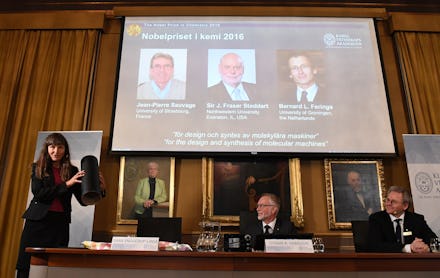These tiny machines just won their inventors the Nobel Prize in chemistry

Good things come in small packages; prestigious things come in microscopic ones.
On Wednesday, the Royal Swedish Academy of Sciences announced that three European chemists won the Nobel Prize in chemistry for creating the "world's smallest machines."
"In terms of development, the molecular motor is at the same stage as the electric motor was in the 1830s, when scientists displayed various spinning cranks and wheels, unaware that they would lead to electric trains, washing machines, fans and food processors," the academy said in the announcement, the New York Times reported.
In other words, these lean, mean, molecule-moving machines show a lot of potential — but have a long way to go.
Jean-Pierre Sauvage, J. Fraser Stoddart and Bernard L. Feringa, the winning scientists, have been making strides in the development of these nanomachines since 1983. In that year, Sauvage formed a chain by linking two ring-shaped molecules. In 1991, Stoddart exhibited that a molecular ring can move along a molecular axle. In 1999, Feringa developed a molecular motor.
The scientists see these manufactured molecular machines as potentially being used to navigate your bloodstream for various medical reasons, such as looking for cancerous cells or delivering drugs. They also see the microrobots as furthering the field of reactive "smart materials." Mark Miodownik, professor of materials and society at University College London, sees these nanomachines as paving the way for self-sustaining smart cities.
"If you want infrastructure that looks after itself — and I think we do — I'm pretty sure we're going to be moving towards self-healing systems," Miodownik told the Guardian. "We'll have plastic pipes that can repair themselves or a bridge that when it gets cracked has these machines that rebuild the bridge at a microscopic scale. It's just beginning. The potential is really immense."
But as Feringa noted, even the tiny are mighty, and that "we have to think about how we can handle these things safely."